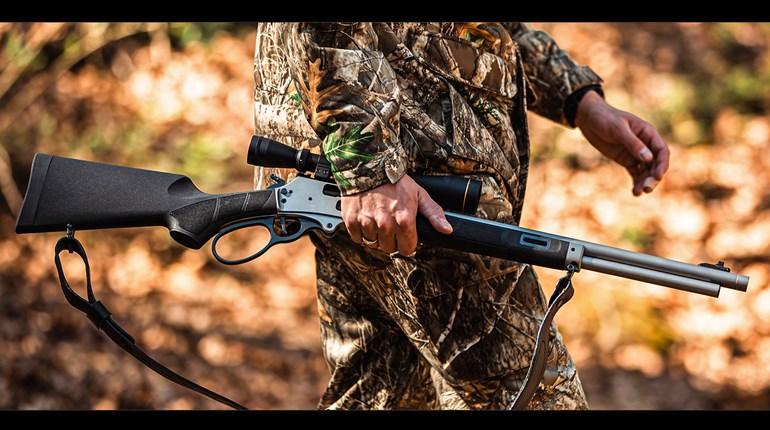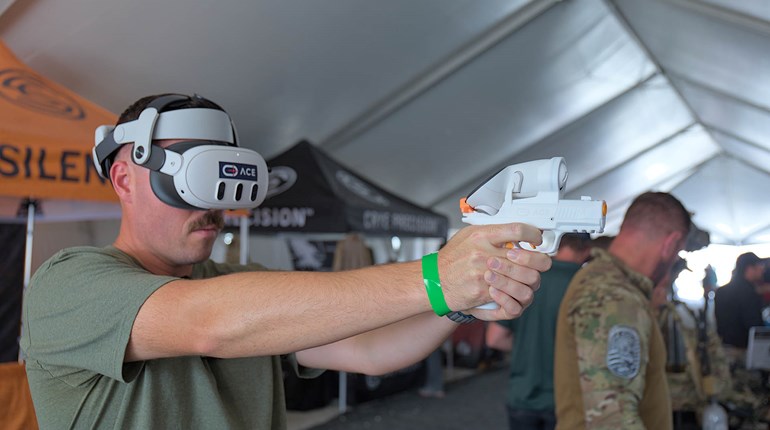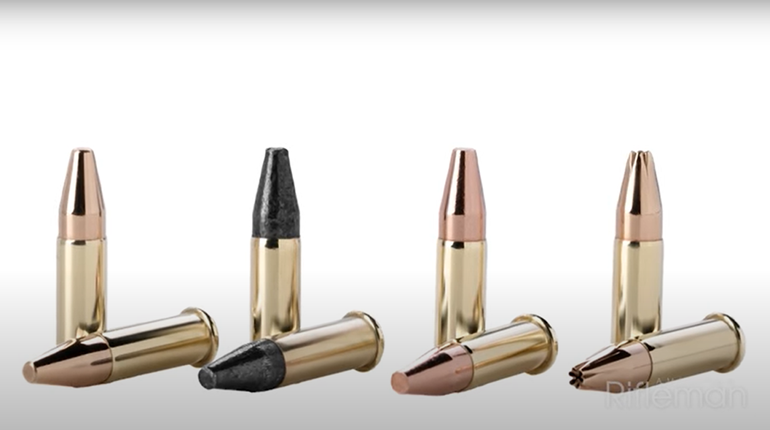
It was to be one of those “trips of a lifetime”—an exploratory hunt for Dall sheep in Alaska’s Brooks Range. The Brooks Range is about as close to the Arctic Ocean as I am to the Gulf of Mexico, which means that one has to be prepared for all types of weather conditions. We hiked more than 15 miles over the course of 19 hours on the first day alone, and it didn’t get much easier from there. This is the type of hunt that puts the hunter—and his gear—to the ultimate test.
I’ve hunted in the backcountry of the mountain west enough to know what my gear preferences are but, for this hunt, I gave everything a fresh look. Here’s what I decided on and how it all performed.

Guns, Optics and Ammo
• Kimber Montana .308 Winchester
• Leupold VX-5HD 3-15x44mm CDS-ZL2
• Leupold Dual Dovetail Mounts
• Federal Premium Edge TLR 175-grain .308 Win.
• Dick Murray Custom Leather A-1 Sling
You hunt sheep with your legs and your glass but you still have to kill them with a gun or bow. Since this was a backpack hunt, I chose the proven Kimber Montana chambered in .308 Winchester. The .308 wasn’t my first choice, but I wanted to test Federal Premium’s new Edge TLR ammunition, and for 2017 it was only available in .30 cartridges. Topped with Leupold’s VX-5HD scope, the entire rig weighed-in at 6 pounds, 11 ounces. Because leaving rifles alone is not my strong suit, I bedded the Kimber’s recoil lug and adjusted the trigger to a three-pound break. With several loads, including Federal’s 175-grain Edge TLR, three-shot groups were reliably under ½-inch MOA. My first three rounds with the Edge TLR load measured just .30-inch.

Clothing and Rain Gear
• First Lite Corrugate Guide Pant
• First Lite Merino Base Layer Boxers and Bottoms
• Sitka Gear Merino Core Zip-T
• First Lite Uncompahgre Insulated Jacket
• First Lite SEAK Stormtight Rain Jacket
Hunting the Brooks Range in August could mean anything from bluebird skies, to pouring rain and even snow, which meant that my apparel choices could mean the difference between comfort and misery—or worse—hypothermia. Since my gear weight was vitally important, each article of clothing had to be 100 percent necessary or it was left behind. Due to the duration of the hunt and the conditions I’d likely face, I chose merino wool clothing from First Lite. Wool stays warm even when wet, and doesn’t absorb body odors as readily as synthetics. Unlike the heavy wool gear of old, First Lite’s wool clothing is extremely lightweight and designed for mountain hunts. Hiking from dawn to dusk in the same clothes for two weeks can get pretty nasty, and though no one rushed out to hug me when I landed back in Fairbanks, the wool kept the odor to a minimal level.
As it turned out, I needed every layer of clothing that I packed along. As is the case with many mountain hunts, one minute we were stripped to our sweat-soaked base layers, while just moments later we found ourselves bundled-up and shivering. Two days into our hunt, the wind shifted to the north and rain, fog and snow blanketed our valley. When we were able to make it out of camp during the storms, my puffy jacket and rain gear were able to keep me relatively warm.
I was so impressed with the First Lite clothing that it has become my “go-to” for subsequent hunts, including a high-country elk hunt in Utah and an extremely cold mule deer trip in eastern Wyoming. Unlike some other brands of “technical” hunting clothing, most of First Lite’s options are also quiet enough to wear during whitetail hunts back home.

Pack and Sleeping Bag
• Stone Glacier Sky Talus 6900
• KUIU TAKU 9000 Gear Bag
• Kifaru Slick Bag
Your pack is your pickup truck as well as your home on a hunt like this—skimp on it and you’ll regret it. After looking at Stone Glacier packs at the SCI show, I decided to buy a Sky Talus 6900. I have high-quality packs from some of the top brands, but this pack quickly became my favorite. It was comfortable hour after hour, durable and had room for all of my gear. The long external pockets were perfect for packing my Meopta spotting scope, and the various sections kept my gear organized and easy to access. I was able to pack everything that I needed for two weeks in this pack without having to check any additional luggage.
I’d originally packed my lighter 20-degree Kifaru sleeping bag but, just before I left for the airport, the weather forecast changed significantly and I traded it out for my 0-degree Kifaru Slick Bag. That turned out to be the single best decision I made on this trip, since a few days later I found myself dressed in all of my clothes, huddled inside that bag for more than 48 hours. After long days on the mountain, I would crawl into this bag soaking wet and wake up in dry clothes—I cannot say enough good things about it.

Footwear
• La Sportiva Trango Cube GTX
• REI Midweight Wool Hiking Socks
• Fox River X-Static Liner Socks
• First Lite Brambler Gaiters
• Wiggy’s Lightweight Waders
I’ve struggled to find the right boots for my feet, and have ended more than one hunt with world-class blisters on my narrow heels. I settled on La Sportiva’s that, along with a two-sock combination, eliminated any painful heel slip during my training hikes. With these boots and the techniques from John Vonhof’s “Fixing Your Feet,” I was able to hike fifty-plus miles in mountainous terrain without a single blister. The bad news was that the constantly wet conditions caused these boots to soak-through after a few days. Whether the Gore-Tex barrier leaked or was simply overwhelmed by the moisture, I found myself hiking with wet socks on the final days of the hunt.
Hunting Alaska means crossing rivers and streams, and for that role, I packed a set of Wiggy’s lightweight waders. These waders work fairly well for their intended purpose but aren’t very durable. If I did it again, I would pack a set of waterproof “glacier socks” along with a pair of Crocs for crossing rivers—the Crocs do double-duty as camp shoes and the thigh-high waterproof “socks” weigh next to nothing. For swampy areas and small creeks, a length of 550 cord wrapped tightly around one’s gaiters is a great way to stay dry.

Important Odds and Ends
• First Lite Grizzly Cold Weather Glove
• Garmin inReach Explorer+ GPS
• Leki Corklite Trekking Poles
If you told me that I could go sheep hunting in Alaska for free but I had to leave the trekking poles at home, I’m not sure what I would do. The terrain is steep, shale and talus making for difficult climbing, and wet, uneven ground is a constant injury risk. Our first day “death march” found us traversing wet rock slides for hours in the dark as we made our way back to the valley floor. The lichen-covered rocks were a slick as ice, and thanks to my Leki Corklite trekking poles, I was able to traverse them without injury.
Garmin’s Explorer+ not only provided us with location information, it allowed me to stay in touch with my family back home (when you’re a father of three little ones, this is a big deal) and also allowed us to communicate with our outfitter/pilot at base camp via satellite text messages. This device could be a lifesaver if things turned ugly.
Almost as an afterthought, I packed a pair of First Lite Grizzly gloves when I saw that the weather was turning bad. Cold hands make for pure misery and these incredibly warm gloves were just the ticket for glassing for hours on a cold, wet ridge.

Preparation and Fitness
Physical fitness is an extremely important factor on a hunt such as this one, and can make the difference between not only success and failure, but also misery and enjoyment. I work out year-round, but I live on flat ground, nearly at sea level. To prepare myself physically, I turned to the expertise of Eric Frohardt, who is now the Director of Education and Training at the NRA. At the time, Eric was serving as the CEO of StrongFirst, a kettlebell-focused fitness resource, but he is also a former Navy SEAL with significant alpine climbing and backcountry hunting experience. He prescribed a seemingly simple program of kettlebell exercises that took me less than three hours per week to complete.
The best part was that, because my only “gear” was a 53-pound kettlebell and my own body, I was able to keep-up with my workouts while on the road. On the “off” days, I loaded my Stone Glacier pack with 50 pounds of dry concrete and hiked the local hills for as long as my schedule would allow. This prepared my body, feet and boots for the rigors of the hunt and helped me adapt to wearing a pack for hours at a time.
Though at times this workout seemed “too easy” compared to some of the vomit-inducing workouts that I’ve done for past hunts, I have never been better physical prepared for a hunt. Not once did I fall behind my guide or ask him to stop for a break. In fact, there were times when my guide wanted to stop, but I was ready to press on—evidence that he was using his brain when I was not. If you find yourself preparing for a tough hunt, or just want to increase your fitness level, give StrongFirst a look. I spent a few hours with StrongFirst Instructor Jody Beasley in Alabama to ensure that my technique was dialed-in before I began the program, something that I highly recommend. You can find a StrongFirst instructor near you using the tool on the company’s website.
Marksmanship is a key component of preparing for any hunt so I spent a significant amount of time on the range, mostly from realistic field positions. As a supplement to shooting the rifle that I’d be taking on the hunt, I used a second Kimber Montana, identical to my .308 but instead chambered in .223, which allowed me to put lots of rounds downrange with minimal recoil and expense.

Food
• Heather's Choice Backpacking Food
• Clif Bars
• Starbucks Via
Just like everything else on a sheep hunt, your food needs to be lightweight. Many freeze-dried backpacking meals are downright nasty to eat and aren’t overly-kind to the stomach. On this trip, I used meals from Heather’s Choice and found them to be both tasty and nutritious. I packed the meals for each day in a gallon-sized Ziploc bag, along with trail mix and other snacks for that 24-hour period. Stuffing two bags in my pack each morning meant that I’d have two days of food available when I left camp, something that is quick and easy to do, even in the dark. Starbucks Via packets are a great backcountry treat if you’re a coffee drinker. I added hydration and recovery supplements designed for triathlons to each day’s ration to keep my body running.
This was a tough hunt in a challenging environment. The right mindset, preparation and gear can make all of the difference in the world when conditions get tough. Most of us have grown accustomed to instant availability of virtually anything we can imagine. In such a remote location, you are quickly reminded that nature controls the pace, and everything you might need better be in your pack. Train and prepare for the worst, hope for the best and soak up every moment of the experience. For a non-resident of Alaska, a sheep hunt requires an outfitter and the overall cost can be quite high. If you are able to make such a trip a reality, though, you’ll never forget it.




































